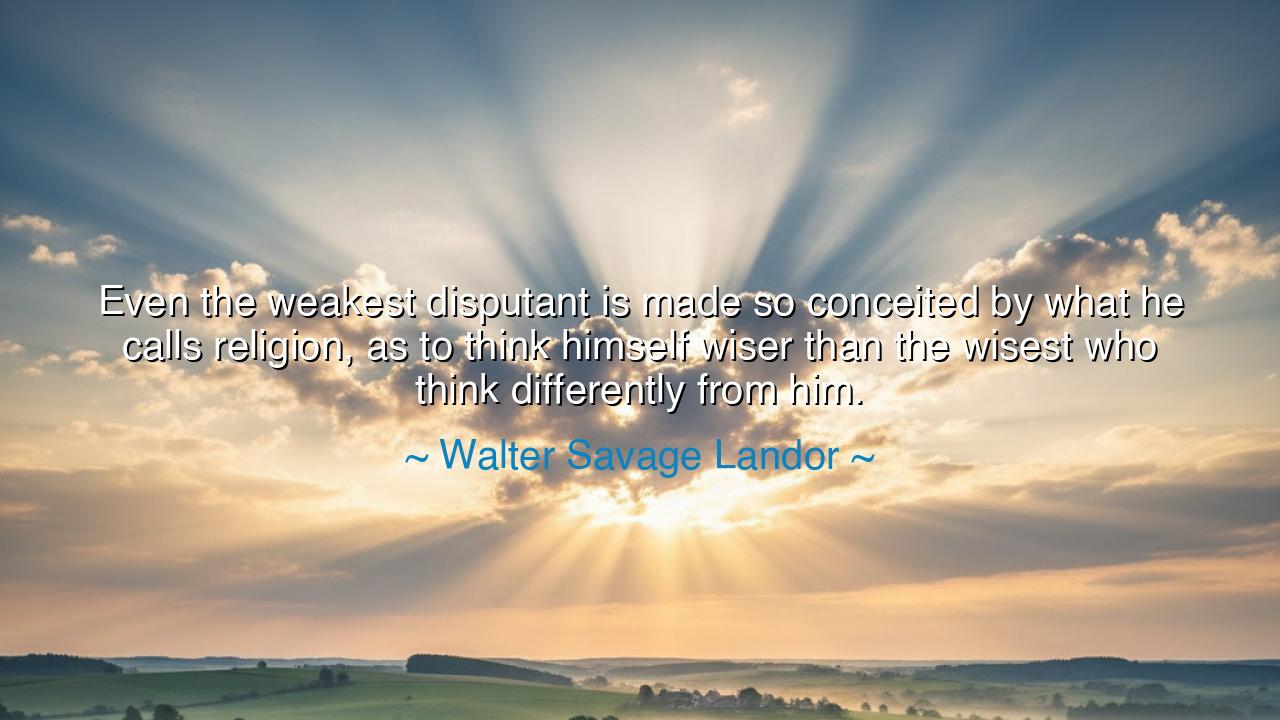
Even the weakest disputant is made so conceited by what he calls
Even the weakest disputant is made so conceited by what he calls religion, as to think himself wiser than the wisest who think differently from him.






In the grand tapestry of human discourse, there exists a troubling yet profound truth that Walter Savage Landor exposes: religion, in its various forms, has a power to blind even the most humble of minds to the wisdom of those who disagree with them. As Landor warns, even the weakest disputant—one who holds little substance in their argument—can be filled with such conceit by their religious beliefs that they begin to view themselves as superior, not only to their adversaries but even to the wisest among them. This human frailty is a deep and ancient flaw, one that has stained the pages of history and shaped the course of many conflicts.
Consider, if you will, the great debates of old. In the days of Socrates, the philosopher walked the streets of Athens questioning all, pushing the boundaries of knowledge and belief. Yet, those who could not bear his questioning clung fiercely to their certainties, wrapped in the comforting cloak of religion and tradition. They saw in their gods the absolute truth, and anyone who questioned that truth was an enemy to be silenced. Socrates, in his wisdom, knew that the greatest enemy was not another’s strength but their certainty—the belief that faith alone could render them wiser than those who questioned, who sought the depths beyond the surface.
Religious conceit has led to many a downfall. We need not look far in history to find examples of men and women who, certain of the righteousness of their beliefs, rejected the wisdom of others simply because those others thought differently. The Crusades, that bloody series of wars fought in the name of Christianity, are a tragic testament to the human tendency to allow religious certainty to breed not peace, but division. The idea that one could hold the ultimate truth, handed down by divine authority, led to violence against those who were deemed to be "heretics"—individuals who, in the eyes of the zealots, stood in opposition not just to truth, but to divine will itself.
Yet this conceit is not confined to any one religion or time. In the name of faith, many have risen against one another, believing their understanding of the divine to be not just different but superior. Landor’s words speak not only to religious figures of the past but also to us in our own time. How often have we seen individuals so consumed by their own beliefs—whether religious, political, or philosophical—that they shut themselves off from the possibility of learning from others? When one believes they possess absolute truth, they close the door to dialogue, to reflection, and to growth. Such is the danger of religious arrogance: it fosters division, not understanding; it builds walls, not bridges.
Yet, in the face of this conceit, we must remember that true wisdom is found not in certainty but in humility. The wisest among us are those who understand the limitations of their own understanding, those who know that the search for truth is a journey, not a destination. The great minds of history—Aristotle, Gautama Buddha, Rumi—were not so arrogant as to believe that they held the final answer to life’s mysteries. Instead, they asked questions, sought deeper understanding, and remained open to the insights of others. The true wisdom of the ages lies not in rigid dogma, but in the recognition of our own ignorance and the willingness to grow beyond it.
Landor’s lesson, then, is one we must take to heart. In our own lives, we must guard against the conceit that comes from thinking we know the truth. Faith should be a source of strength, not arrogance. We should strive to embrace the beliefs of others with the same respect and openness with which we hope our own beliefs are treated. For in the end, it is not our ability to defend our own opinions that marks us as wise, but our ability to engage with others, to learn from their experiences, and to seek truth together in the spirit of humility and understanding.
As we move forward in life, let us keep this in mind: certainty is not the same as wisdom. Humility, not arrogance, leads to enlightenment. And dialogue, not isolation, fosters true understanding. Let us cast aside the conceit that divides us, embracing instead the humility that unites us in our shared search for truth. The world, vast and mysterious, is full of wisdom waiting to be discovered—not by those who are certain they know it all, but by those who are willing to listen, to learn, and to grow.






AAdministratorAdministrator
Welcome, honored guests. Please leave a comment, we will respond soon